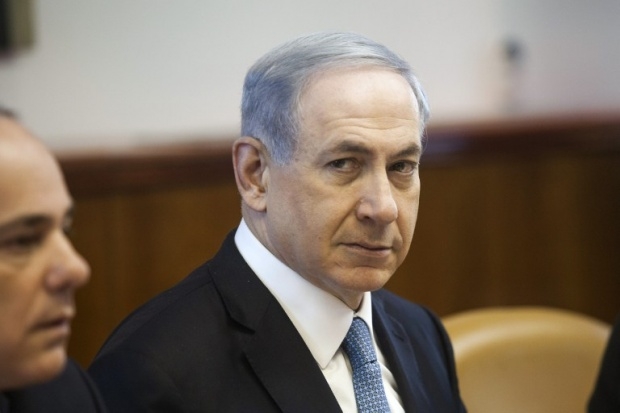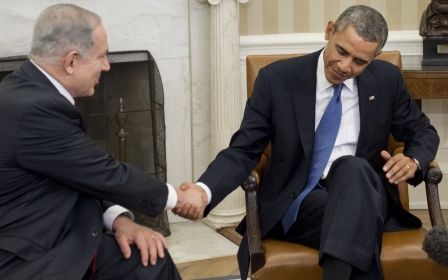ANALYSIS: Israel lobby forms 'circular firing squad' over Netanyahu speech to Congress
With the clock ticking toward an Iran deal, pro-Israel lobbyists are rattling sabres ahead of Netanyahu's speech to Congress

A statesman-like effort in Congress may help Netanyahu in Israel’s 17 March vote (AFP)
Published date: 13 February 2015 11:15 GMT
|
Last update: 9 years 2 months ago
NEW YORK, United States - Tensions between US President Barack Obama and Benjamin Netanyahu over Iran’s nuclear programme show no signs of letting up before the Israeli Prime Minister’s speech to Congress next month. With the clock ticking, lobbyists are rattling sabres ahead of what could be a highpoint of political showmanship.
Netanyahu is due to address Congress on 3 March and critique Obama’s bid to lift sanctions off Iran in exchange for guarantees that it will not build nuclear weapons. Hard-line pro-Israel and anti-Iran lobby groups in Washington are raising the volume on Netanyahu’s fears that the deal will not stop Iran from threatening Israel’s existence and destabilising the Middle East.
They include the Zionist Organization of America (ZOA), whose president Morton Klein vowed this week to “stop this Nazi-like radical Islamic Republic”. Others are United Against Nuclear Iran (UANI) and the Republican Jewish Coalition (RJC), which has reportedly threatened to shame any Democrats who boycott Netanyahu’s address and leave empty seats in Congress.
Netanyahu has allies in Washington, including Israel’s ambassador, Ron Dermer, who has close ties to Republicans. He is also friendly with Sheldon Adelson, an influential Jewish-American casino tycoon who is a key donor to the Republican Party and who spent more than $100m backing Mitt Romney’s failed bid to oust Obama from the White House in 2012.
Adelson, who did not reply to MEE’s interview request, has funded RJC and other hawkish pro-Israel groups. He is provocative; in 2013 he said that negotiations with Tehran should start with a US nuclear strike on Iran’s desert. “I really don’t care what happens to Iran. I am for Israel,” he said in 2008, as reported by the New Yorker. His beneficiaries, RJC and UANI, were also unavailable for comment.
Their approach differs sharply from mainstream pro-Israel groups, such as The American Israel Public Affairs Committee (AIPAC) and the Anti-Defamation League (ADL), which are traditionally supported by both parties. Roughly two-thirds of Jewish-Americans vote Democrat. ADL director Abraham Foxman said Netanyahu’s speech was an “ill-advised” sideshow.
“It’s fascinating to see the Israel lobby line up in a circular firing squad,” Josh Ruebner, author of Shattered Hopes: Obama’s Failure to Broker Israeli-Palestinian Peace, told MEE. “The RJC and the ZOA are taking a very hard partisan line on this speech, much to the consternation of non-partisan Zionist organizations like the ADL and AIPAC, which are staying out of the fray.”
Netanyahu’s address comes ahead of Israel’s elections and a 24 March deadline for the US, Britain, China, France, Germany and Russia to reach an agreement with Iran on safeguards to its nuclear program, ahead of a full-blown accord by 30 June. After more than 18 months of high-stakes talks, negotiators could be close to a deal.
Ahead of any breakthrough, conservative Republicans have sought to impose new sanctions on Tehran, potentially forcing Iran out of the talks. Netanyahu, who fears the deal will jeopardise Israel’s safety, has been criticised for alienating Democrats and embarrassing a US president with plans to trash Obama’s strategy in his own back yard.
Obama says he will not meet Netanyahu in March. Vice President Joe Biden, a backer of Israel, will miss the speech. Nancy Pelosi, a prominent Democrat congresswoman, spoke out against the Netanyahu appearance. According to Natan Sachs, an expert at Brookings Institution, a think tank, centrist pro-Israel lobbyists fear Netanyahu’s gamble is eroding support among Democrats.
“The hard-core right groups are very consistent in their approach and that doesn’t change. They are fighting the backlash against Netanyahu,” he told MEE. “But bipartisan groups like AIPAC find themselves in a difficult position. This speech in Congress flies in the face of a bipartisan approach.”
Those campaigning against Netanyahu’s speech and for Iran talks say they cannot match Adelson’s deep pockets. Groups, such as the US Campaign to End the Israeli Occupation, Roots Action, Jewish Voice for Peace and Code Pink, have instead deployed 100,000 letters and the online catchphrase #skipthespeech to persuade lawmakers to stay home on 3 March.
“It’s like David versus Goliath. We’re at a financial disadvantage, but have grassroots support that others don’t have,” added Ruebner, also a campaigner. “The number of representatives and congressmen who have pledged to boycott the speech increases by the hour, it’s snowballing.”
Netanyahu’s arguments are already well-known and cannot immediately alter Obama’s policy, but he can influence lawmakers and boost the chances of an anti-Iran sanctions bill in Congress, while making it harder for Obama to convince lawmakers to accept the deal once it has been inked by world leaders. A statesmanlike effort in Congress can also help Netanyahu in Israel’s 17 March vote.
“Lobbying matters, but it looks more important from the outside than it really is. The bottom line is voter preferences,” Sachs told MEE. “Here we have a very difficult battle; the American public is fractured, wanting to avoid further entanglement in Middle Eastern wars, but also suspicious of Iran and its intentions and capabilities, along with many congressmen and senators.”
Obama and Netanyahu remain sharply divided on tactics; Israel’s leader wants Tehran left with fewer centrifuges, less uranium and a time-frame of longer than one year to “breakout” with nuclear weapons. Other differences include handling Iran’s missile technology and the timespan of the deal, said Sachs.
For Gary Sick, a former White House official and veteran of US-Iran hostilities, any agreement will be a tough sell in Tehran and Washington.
“The Iranians and the Americans have a body of opinion at home that is opposed to an agreement, in many cases just for political reasons,” he told MEE. “We’re coming to a very real crunch point; leaders on both sides are preparing their domestic audiences for an agreement of some sort that they know is not going to be universally popular.”
Stay informed with MEE's newsletters
Sign up to get the latest alerts, insights and analysis, starting with Turkey Unpacked
Middle East Eye delivers independent and unrivalled coverage and analysis of the Middle East, North Africa and beyond. To learn more about republishing this content and the associated fees, please fill out this form. More about MEE can be found here.



